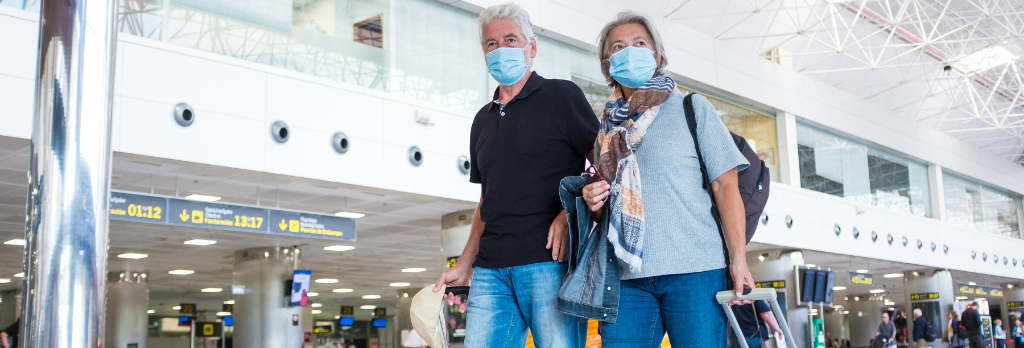
What You Need to Know
- Delay travel until you are fully vaccinated.
- Check your destination’s COVID-19 situation before traveling. State, local, and territorial governments may have travel restrictions in place.
- Wearing a mask over your nose and mouth is required in indoor areas of public transportation (including airplanes) and indoors in U.S. transportation hubs (including airports).
- Do not travel if you have been exposed to COVID-19, you are sick, or if you test positive for COVID-19.
- If you are not fully vaccinated and must travel, get tested both before and after your trip.
Before You Travel
Make sure to plan ahead:
- Check the current COVID-19 situation at your destination.
- Make sure you understand and follow all state, local, and territorial travel restrictions, including mask wearing, proof of vaccination, testing, or quarantine requirements.
- For up-to-date information and travel guidance, check the state or territorial and local health department’s website where you are, along your route, and where you are going.
- If traveling by air, check if your airline requires any testing, vaccination, or other documents.
- Prepare to be flexible during your trip as restrictions and policies may change during your travel.
Do NOT Travel If…
- You have been exposed to COVID-19 unless you are fully vaccinated or revered from COVID-19 in the past 90 days.
- You are sick.
- You tested positive for COVID-19 and haven’t ended isolation (even if you are fully vaccinated).
- You are waiting for results of a COVID-19 test. If you test comes back positive while you are at your destination, you will need to isolate and postpone your return until it’s safe for you to end isolation. Your travel companions may need to self-quarantine.
During Travel
Masks: Wearing a mask over your nose and mouth is required on planes, buses, trains, and other forms of public transportation traveling into, within, or out of the United States and while indoors at U.S. transportation hubs such as airports and train stations. Travelers are not required to wear a mask in outdoor areas of a conveyance (like an open deck area of a ferry or the uncovered top deck of a bus).
Protect Yourself and Others: Follow all state and local health recommendations and requirements at your destination, including wearing a mask and staying 6 feet (2 meters) apart from others. Travelers 2 years of age or older should wear masks in indoor public places if they are not fully vaccinated, if they are fully vaccinated and in an area with substantial or high COVID-19 transmission, or if they are fully vaccinated and with weakened immune systems.
- If you are not fully vaccinated and aged 2 years or older, you should wear a mask in indoor public places.
- In general, you do not need to wear a mask in outdoor settings.
- In areas with high numbers of COVID-19 cases, consider wearing a mask in crowded outdoor settings and for activities with close contact with others who are not fully vaccinated.
- Wash your hands often or use hand sanitizer (with at least 60% alcohol).
After Travel
- ALL Travelers
- Self-monitor for COVID-19 symptoms; isolate and get tested if you develop symptoms.
- Follow all state and local recommendations or requirements after travel.
- If you are NOT Fully Vaccinated
- Self-quarantine and get tested after travel:
- Get tested with a viral test 3-5 days after returning from travel.
- Check for COVID-19 testing locations near you.
- Stay home and self-quarantine for a full 7 days after travel, even if you test negative at 3-5 days.
- If you don’t get tested, stay home and self-quarantine for 10 days after travel.
- Get tested with a viral test 3-5 days after returning from travel.
- Self-quarantine and get tested after travel:
If Your Test is Positive
Isolate yourself to protect others from getting infected. Learn what to do and when it is safe to be around others.
If you Recently Recovered from COVID-19
You do NOT need to get tested or self-quarantine if you recovered from COVID-19 in the past 90 days. You should still follow all other travel recommendations. If you develop COVID-19 symptoms after travel, isolate and consult with a healthcare provider for testing recommendations.
To learn more, please visit https://www.cdc.gov/coronavirus/2019-ncov/travelers/travel-during-covid19.html.
